- Joined
- Apr 14, 2011
- Messages
- 17,867
- Points
- 113
India's holiest river Ganges is swollen with Covid victims
By Geeta PandeyBBC News, Delhi
Published19 May
Share
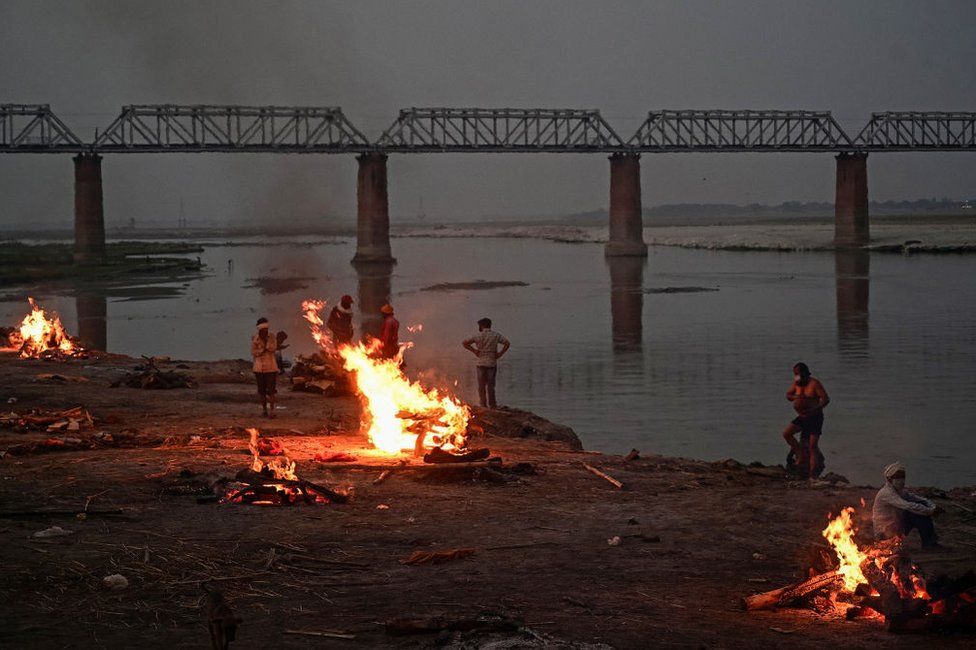
image captionFuneral pyres are lit by the Ganges in Allahabad, where bodies have been washing downstream for days
India's holiest river, the Ganges, has been swollen with bodies in recent days.
Hundreds of corpses have been found floating in the river or buried in the sand of its banks. Those who live close to where they have washed up, in the northern state of Uttar Pradesh, fear they are Covid-19 victims.
India has been overwhelmed by a devastating second wave of the pandemic in recent weeks. It has recorded more than 25 million cases and 275,000 deaths, but experts say the real death toll is several times higher.
The bodies on the river banks, taken together with funeral pyres burning round-the-clock and cremation grounds running out of space, tell the story of a death toll unseen and unacknowledged in official data.
The BBC spoke to local reporters, officials, and eyewitnesses in some of the worst affected districts of Uttar Pradesh and found that behind the story of the floating bodies lies traditional beliefs, poverty, and a pandemic killing people at lightning speed.
River beds dotted with graves
The horror in Uttar Pradesh first came to light on 10 May when 71 corpses washed up on the river bank in Bihar's Chausa village, near the state border.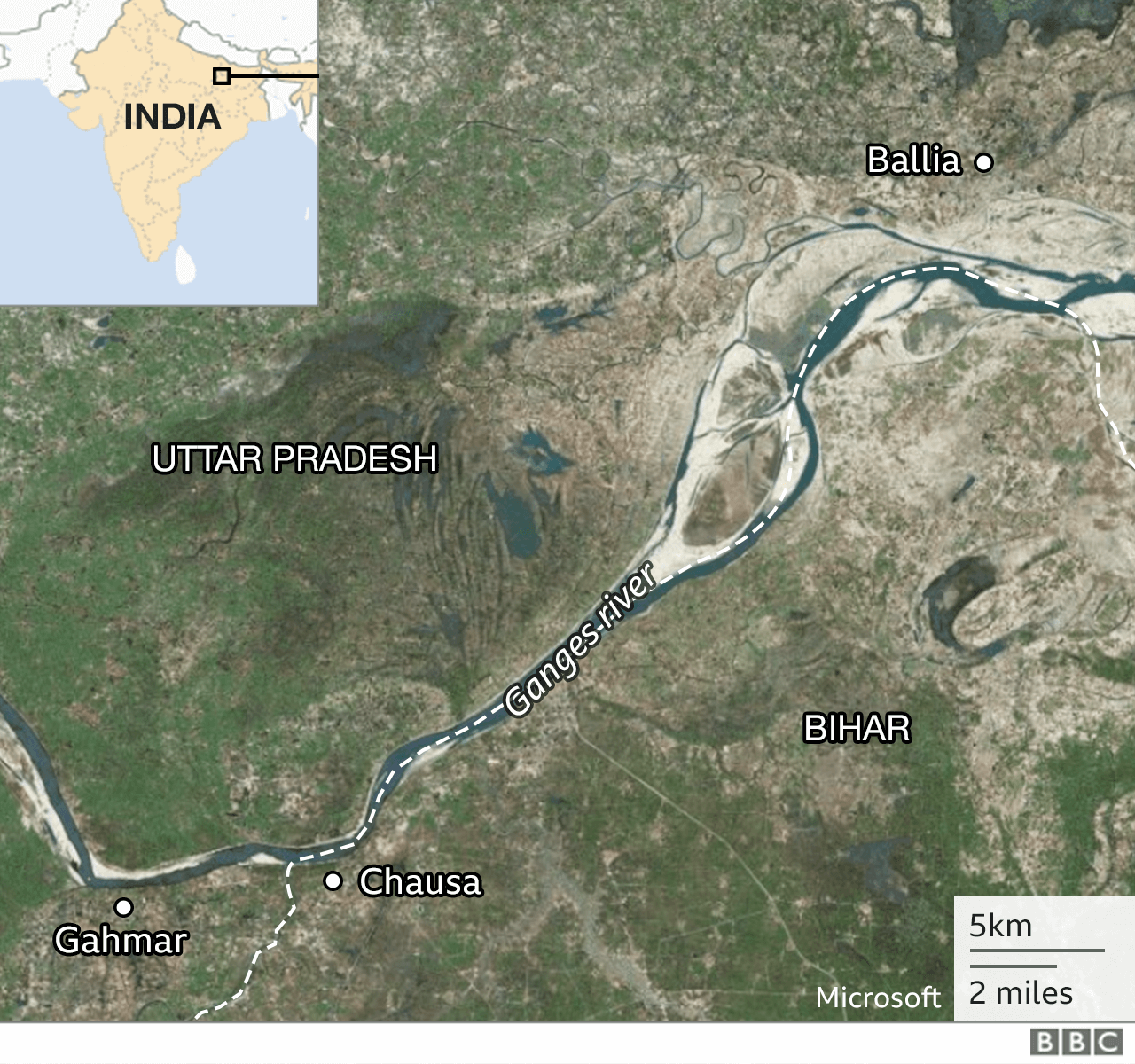
Neeraj Kumar Singh, superintendent of police for Buxar, where Chausa is located, told the BBC that autopsies were carried out on the mostly decomposed bodies, DNA samples were taken, and the bodies buried in pits near the river bank.
Officials said some of the remains could be body parts which had found their way into the Ganges after routine cremations on the banks, but they suspected the corpses had been dumped in the river. The police installed a net across the water to catch any more.
A day later, six miles (10km) from Chausa, dozens of heavily decomposed bodies were found strewn on the river bank in Gahmar village in Uttar Pradesh's Ghazipur district, with feral dogs and crows feasting on them.
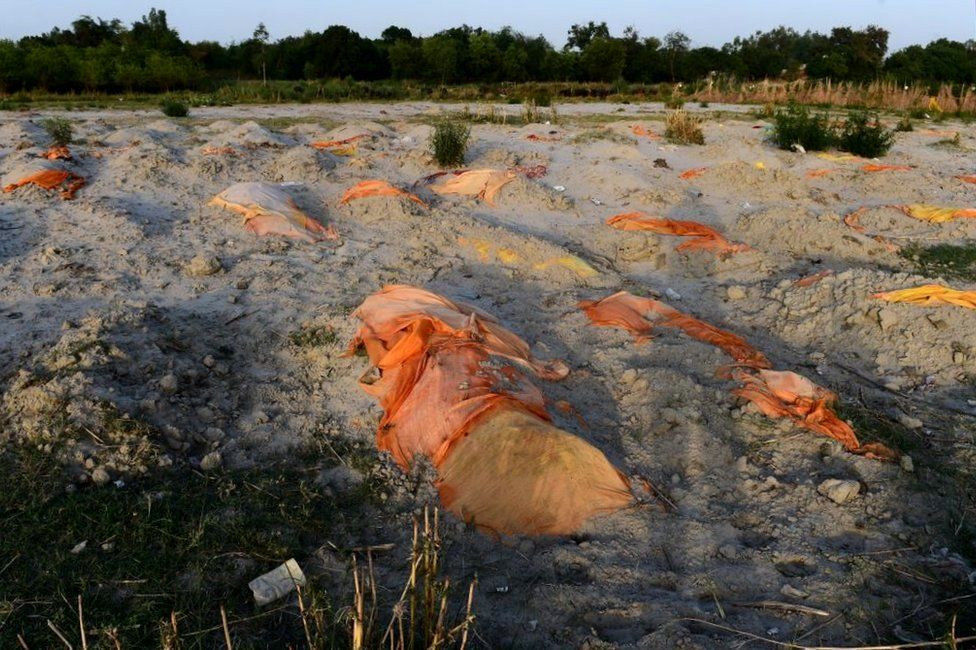
image captionHundreds of corpses have been found floating in the river or buried in the sand of its banks.
- More bodies wash up on bank of river Ganges
- 'Wherever you look, you see ambulances and bodies'
- Anger rises as Covid rages in Modi's constituency
Dozens of bloated and decomposed bodies floating in the river also greeted villagers in the neighbouring Ballia district when they went for their morning dip in India's most sacred river. The Hindustan newspaper reported that police retrieved 62 corpses.
In Kannauj, Kanpur, Unnao, and Prayagraj, the river bed is dotted with shallow graves. Videos sent to the BBC from the Mehndi ghat embankment in Kannauj show scores of human-sized mounds. Many look just like a bump in the river bed, but each one hides a body. At the nearby Mahadevi ghat, at least 50 bodies were found.
A 'massive' discrepancy in the death toll
Traditionally, Hindus cremate their dead. But many communities follow what is known as "Jal Pravah" - the practice of floating in the river the bodies of children, unwed girls, or those who die from infectious diseases or snake bites.Many poor people also cannot afford cremation, and so they wrap the body in white muslin and push it into the water. Sometimes, the bodies are tied to stones to ensure they remain submerged, but as many are floated without weights. In normal times, corpses floating in the Ganges are not an uncommon sight.
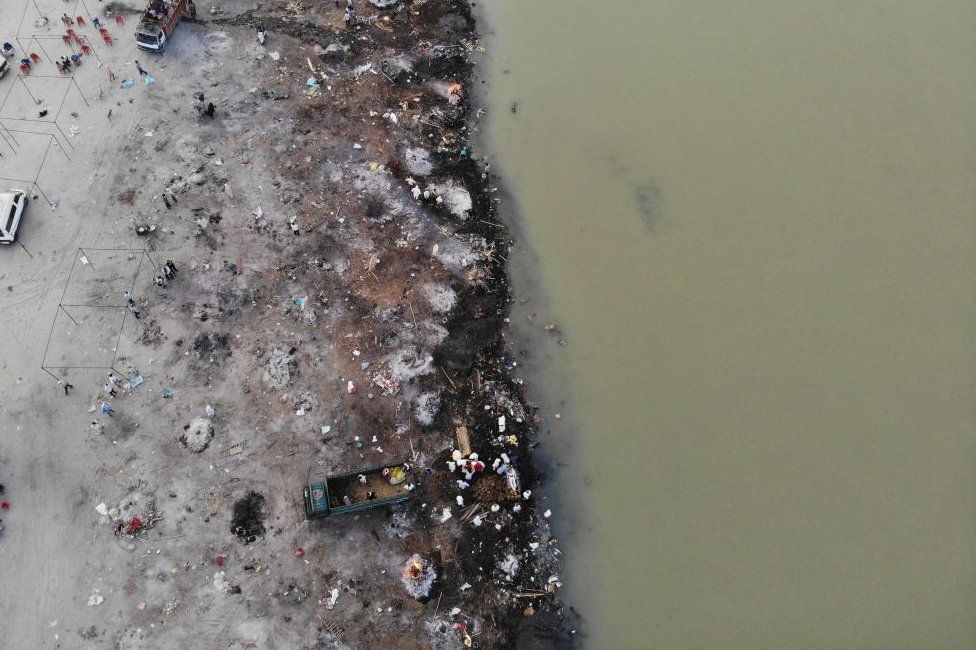
image captionFuneral pyres are seen along the banks of the Ganges in Garhmukteshwar, Uttar Pradesh
What is rare is that so many are turning up in such a short time, and in so many places along the river bank. A journalist in Kanpur told the BBC the corpses were evidence of a "massive discrepancy between the official Covid-19 death figures and the actual numbers on the ground".
He said officially 196 people had died from the virus in Kanpur between 16 April and 5 May, but the data from seven crematoriums showed nearly 8,000 cremations.
"All electric crematoriums were running 24/7 in April. Even that was not enough, so the administration allowed the grounds outside to be used for cremations using wood," he said.
"But they only accepted bodies that were coming from hospitals with Covid-19 certificates, and a huge number of people were dying at home, without getting any tests. Their families took the bodies to the outskirts of the city or to neighbouring districts like Unnao. When they couldn't find wood or a cremation spot, they just buried them on the river bed."
A journalist in Prayagraj said he believed that many of the bodies were either Covid patients who died at home without a test, or poor people who couldn't afford a cremation.
"It is heartbreaking," he said. "All these people were someone's son, daughter, brother, father and mother. They deserved some respect in death. But they have not even become part of the statistics - they died unknown and were buried unknown."
Burials from 7am to 11pm
The discovery of the graves and rotting bodies, and the fear that they could be infected with the coronavirus, has sent shockwaves through the villages along the river's banks.Originating in the Himalayas, the Ganges is one of the world's largest rivers. Hindus consider it sacred, they believe that bathing in Ganges will cleanse their sins and use its water for religious rituals.
In Kannauj, Jagmohan Tiwari, a 63-year-old villager, told a local channel that he had seen "150-200 graves" on the river bed. "The burials have been going on from 7am to 11pm," he said. "It is soul destroying."
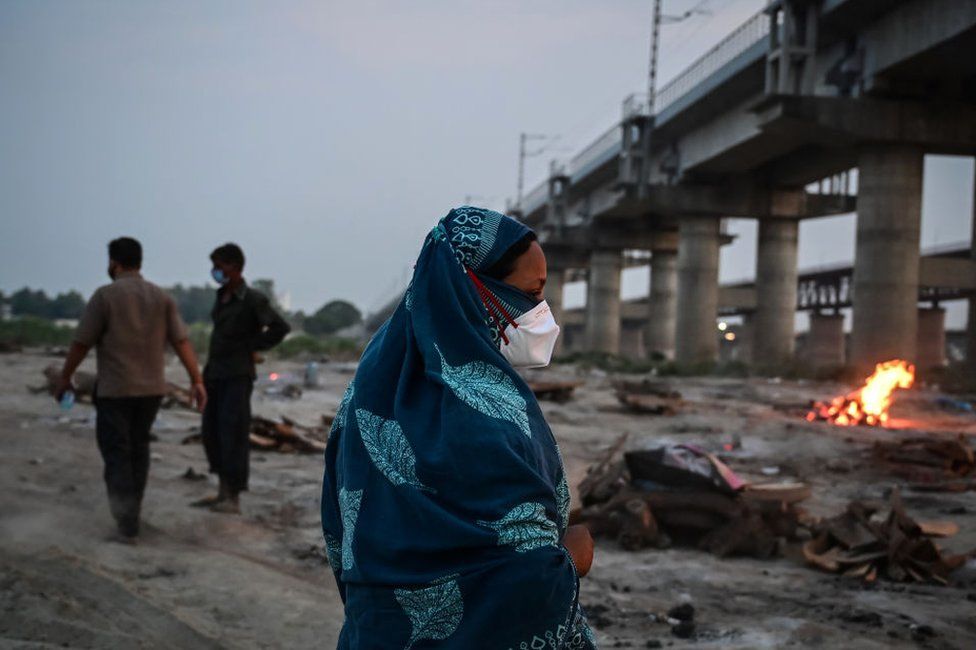
image captionA relative of a a victim stands near the banks of the river while bodies are cremated in Allahabad, Uttar Pradesh
The discovery of the graves has triggered panic in the area. People fear that the bodies buried on the surface will begin to float in the river once it rains and the water levels rise.
Last Wednesday, the state government banned "Jal Pravah" and offered funds to poor families unable to afford cremations. In many places, police have been pulling corpses out of the river with sticks and recruiting boatmen to bring them ashore. There, the decomposed bodies are either buried in pits or burnt on funeral pyres.
Vipin Tada, the superintendent of police in Ballia, said they were talking to village council leaders to make them aware that bodies should not be floated in the rivers and that those who could not afford a cremation could seek financial help.
Ghazipur District Magistrate Mangala Prasad Singh told the BBC that teams were patrolling embankments and cremation grounds to stop people from dumping bodies in water or burying them.
But his team is still finding one or two bodies in the river every day.
"We have been performing their final rites, as per rituals," he said.
Additional reporting by Soutik Biswas and Vikas Pandey
